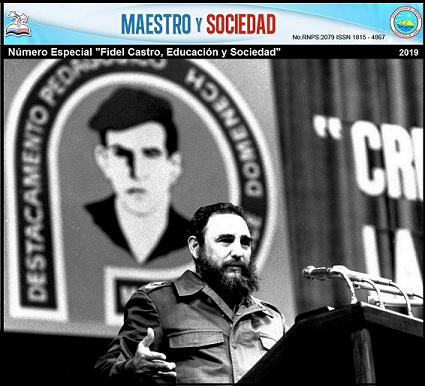Formation process of Fidel Castro Ruz's vision of the environment
Keywords:
environment, environmental crisis, sustainable development, thinking of Fidel Castro RuzAbstract
The work presented with the title Vision of Fidel Castro Ruz on the environment aims to analyze some elements that make up the vision of Fidel Castro Ruz on the environment that favor the understanding of the pressing problems of the current world. Among these elements we have the main factors that influenced the process of conformation of Fidel Castro's vision about the environment, through three moments: formative, mature and projective. The conformation of Fidel Castro's vision of the environment has the following particularities: first, the family context, education received from an early age includes respect for nature. As well as, the link with his political ideology, where he reflects José Martí's ideas regarding poverty, underdevelopment and social inequality. It is also linked to the strong influence of internal and external advanced thinking, of each context, and its implementation in solving problems within the nation and in other nations through cooperative relationships.
References
2. Betto, F. (1985). Fidel y la Religión. La Habana: Oficina de Publicaciones del Consejo de Estado.
3. Blanco, K. (2009). Todo el tiempo de los Cedros. Paisaje familiar de Fidel Castro Ruz. La Habana: Casa Editorial Abril.
4. Castro R., F. (2008). La Historia Me Absolverá. La Habana: Oficina de Publicaciones del Consejo de Estado, Editorial Pueblo y Educación.
5. Castro R., F. (1983). La Crisis económica y social del mundo, sus repercusiones en los países subdesarrollados, sus perspectivas sombrías y la necesidad de luchar si queremos sobrevivir, La Habana: Informe a la VII Cumbre de los Países No Alineados, Oficina de Publicaciones del Consejo de Estado.
6. Castro R., F. (1984). Discurso en el Acto Central por el Aniversario XXXI del Asalto a los cuarteles Moncada y Carlos Manuel de Céspedes. (s.p.e.).
7. Giannuzzo, A. N. (2010). Los estudios sobre el ambiente y la ciencia ambiental. Scientiae studia 8(1), 132. Recuperado de http://www.scielo.br/scielo.php?script=sci_arttext&pid=S1678-31662010000100006
8. Hernández G., M. y Espronceda A., M. (2012). La relación cultura y ambiente: hacia una nueva construcción teórica. Recuperado de http://www.ucol.mx/resifro/pdf/SF8003.pdf
9. Miranda, C. (2000). El análisis filosófico dialéctico materialista de lo ambiental como totalidad, (Tesis de doctorado). Universidad de La Habana, La Habana, Cuba.
10. Noguera de E., A. P. (2012). Educación, Pensamiento Ambiental y Desarrollo. Recuperado de http://www.bdigital.unal.edu.co/7076/1/anapatricianogueradeecheverri.2000.pdf
11. Mencía, M. (1981). La prisión fecunda. La Habana: Editora Política.
Downloads
Published
How to Cite
Issue
Section
License
This journal provides immediate open access to its content, based on the principle that offering the public free access to research helps a greater global exchange of knowledge. Each author is responsible for the content of each of their articles.



























 Universidad de Oriente
Universidad de Oriente 